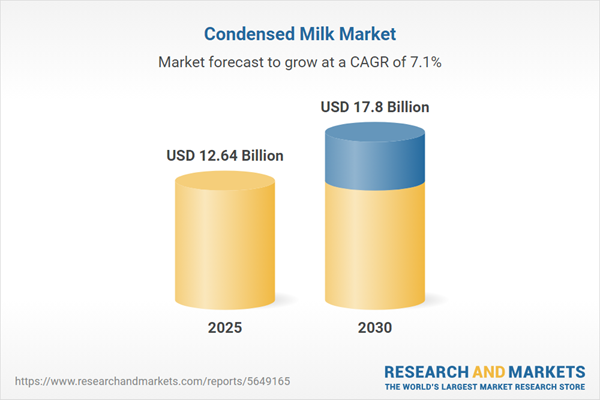Condensed milk is a thick, concentrated form of milk from which most of the water content has been removed. While it is commonly sweetened, unsweetened condensed milk is also available in the market. This food processing technique helps extend the product's shelf life, even without refrigeration, as the reduced water content inhibits microbial growth. Condensed milk is highly versatile and widely used in various culinary applications, such as in baking, for adding richness and sweetness to cakes, cookies, and other baked goods. In confectionery, it is essential for making candies and toffees due to its creamy texture. Condensed milk is also popular in beverages as it is often used for whitening tea or coffee and in milkshakes, cold coffees, and smoothies. It also has its applications in ice cream.
The condensed milk industry is projected to witness significant growth during the forecast period, along with the growing demand for processed dairy products. The increasing utilization of condensed milk to develop chocolate and confectionery items is further augmenting the market in the forecast period. With the growing consumption of tea and coffee beverages, condensed milk has found substantial application in tea and coffee whitening, further propelling the market expansion. Additionally, with the increasing purchasing power of consumers, especially in the world's developing regions, condensed milk is gaining traction among customers for utilization in various cuisines.
Global Condensed Milk Market Drivers
Rising Demand in the Beverages and Confectionery Sectors Driving Growth of the Condensed Milk Market
Condensed milk is utilized as one of the essential milk ingredients to prepare varied food items in the beverage and confectionery industries. It is used to prepare high-quality caramel fillings, chocolate bars, toffees,ice creams, and numerous desserts and sweets. It is also widely demanded in beverages, often used for whitening tea or coffee and in milkshakes, cold coffees, and smoothies. Hence, the market growth for condensed milk is quite promising in the forecast period.The quality of the finished product is highly dependent on the quality and recipe of the sweetened condensed milk utilized as an ingredient. It is responsible for providing a unique caramel taste and influencing the desired consistency and mouthfeel of the finished product. In addition, the fat content, dry matter content, and sugar content are also of prime importance during the production of condensed milk for different food applications.
Global Condensed Milk Market Geographical Outlook:
Asia-Pacific is anticipated to be the fastest-growing market of global condensed milk during the forecast period
During the forecast period, the Asia-Pacific region will be experiencing the fastest growth in the global condensed milk market. Several reasons are increasing the growth rate in the global condensed milk market, such as the increasing demand for dairy products because of the changing food habits of the people with increased urbanization. The market will also experience high growth due to the rising population and the growing economies in India, China, etc., leading to growth in disposable income, thus increasing the demand for premium products like condensed milk. Hence, the demand for condensed milk in the Asia-Pacific region will be high in the forecast period.Reasons for buying this report:
- Insightful Analysis: Gain detailed market insights covering major as well as emerging geographical regions, focusing on customer segments, government policies and socio-economic factors, consumer preferences, industry verticals, other sub-segments.
- Competitive Landscape: Understand the strategic maneuvers employed by key players globally to understand possible market penetration with the correct strategy.
- Market Drivers & Future Trends: Explore the dynamic factors and pivotal market trends and how they will shape up future market developments.
- Actionable Recommendations: Utilize the insights to exercise strategic decision to uncover new business streams and revenues in a dynamic environment.
- Caters to a Wide Audience: Beneficial and cost-effective for startups, research institutions, consultants, SMEs, and large enterprises.
What do businesses use our reports for?
Industry and Market Insights, Opportunity Assessment, Product Demand Forecasting, Market Entry Strategy, Geographical Expansion, Capital Investment Decisions, Regulatory Framework & Implications, New Product Development, Competitive IntelligenceReport Coverage:
- Historical data & forecasts from 2022 to 2030
- Growth Opportunities, Challenges, Supply Chain Outlook, Regulatory Framework, Customer Behaviour, and Trend Analysis
- Competitive Positioning, Strategies, and Market Share Analysis
- Revenue Growth and Forecast Assessment of segments and regions including countries
- Company Profiling (Strategies, Products, Financial Information, and Key Developments among others)
The Global Condensed Milk Market is segmented and analyzed as follows:
By Type
- Sweetened Condensed Milk
- Unsweetened Condensed Milk
By Application
- Biscuits & Pastries
- Chocolate & Confectionary
- Ice Creams
- Beverages
- Others
By End-User
- Household
- Commercial
By Distribution Channel
- Online
- Offline
By Geography
- North America
- South America
- Europe
- Middle East and Africa
- Asia-Pacific
Table of Contents
Companies Mentioned
- Eagle Family Foods Group LLC
- Galloway Company
- Nestle
- Amul (GCMMF)
- Dana Dairy Group
Table Information
| Report Attribute | Details |
|---|---|
| No. of Pages | 152 |
| Published | December 2024 |
| Forecast Period | 2025 - 2030 |
| Estimated Market Value ( USD | $ 12.64 Billion |
| Forecasted Market Value ( USD | $ 17.8 Billion |
| Compound Annual Growth Rate | 7.0% |
| Regions Covered | Global |
| No. of Companies Mentioned | 5 |









